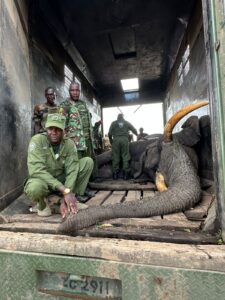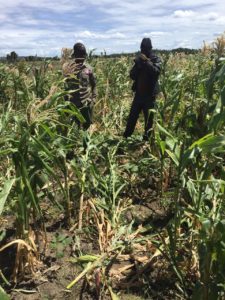
Maize crops in the Munyas area are nearing harvest time and we have seen an increase in conflict in this area. The Munyas human-elephant conflict (HEC) team has been reacting to conflict in this area on a daily and nightly basis. A number of farms have already been destroyed (pictured left) and farmers have retaliated by shooting elephants with arrows. We have met this challenge by deploying this team at night to safely chase the crop-raiding herds before they enter too deep into the farms. There was a total of 23 incidents of human-elephant conflict this reporting period, the most occurring in Munyas.
MEP Monthly Report May 2019
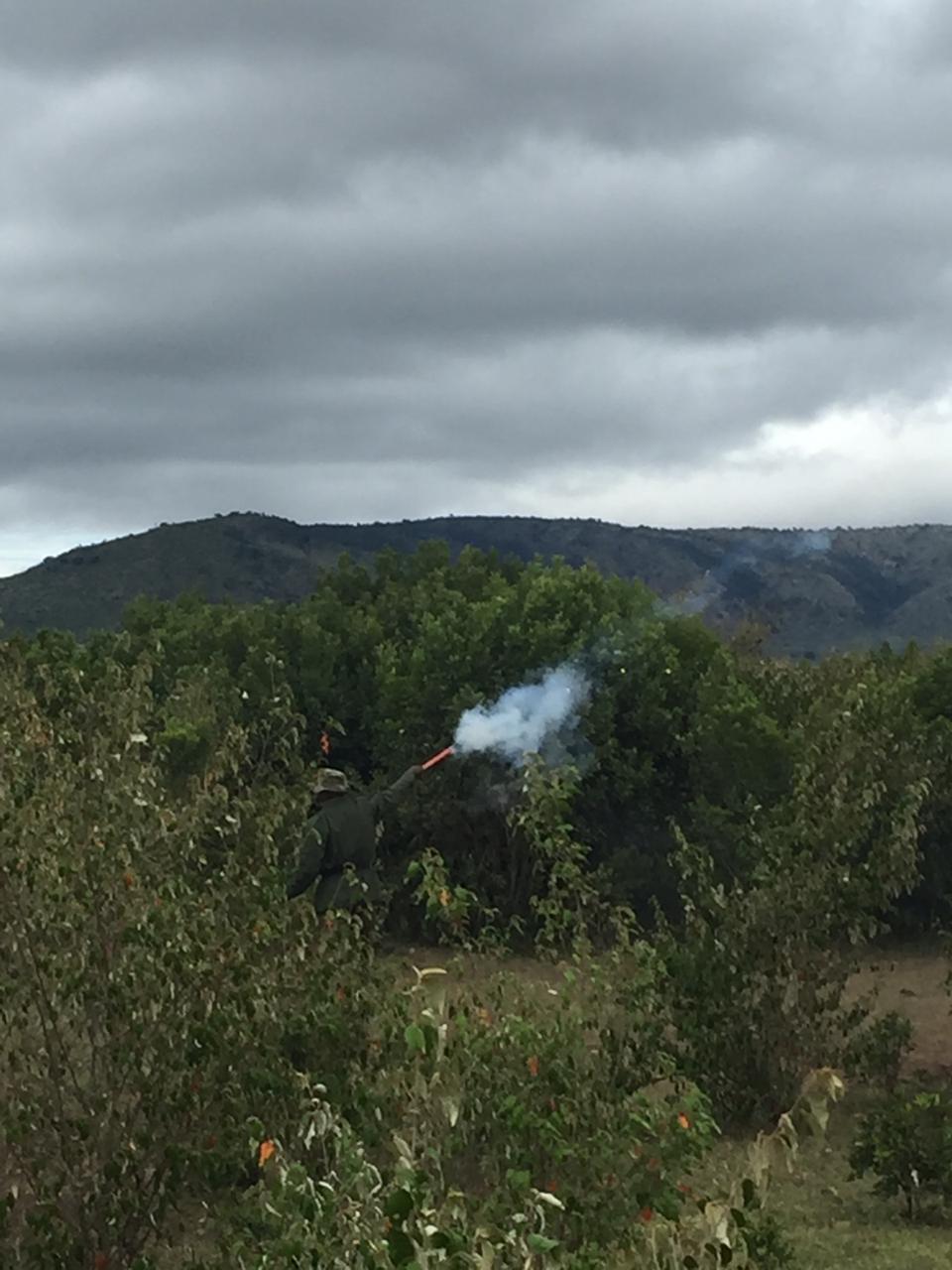
A MEP ranger shooting a firecracker away from an elephant herd in Munyas to safely move them away from the crops.
As a response to an increased conflict season, an HEC meeting was held at Kimelok School in the Oloonkolin area. Among the stakeholders; KWS Kilgoris Warden, MEP, MNC and the Oloisukut Conservancy all attended. The objective was to discuss the long- and short-term solutions to the continuing conflict in this area. The long-term solutions discussed were: building a twenty kilometers electric fence to prevent the wild animals not to raid the crops across the river; employing some people as part of the rangers. The short-term solutions discussed were; putting the solar lights in all hot spot crossing areas to stop the elephants from crossing into farmland and increasing the ranger’s patrols to both day and night to move the elephants back as part of the quick response help.
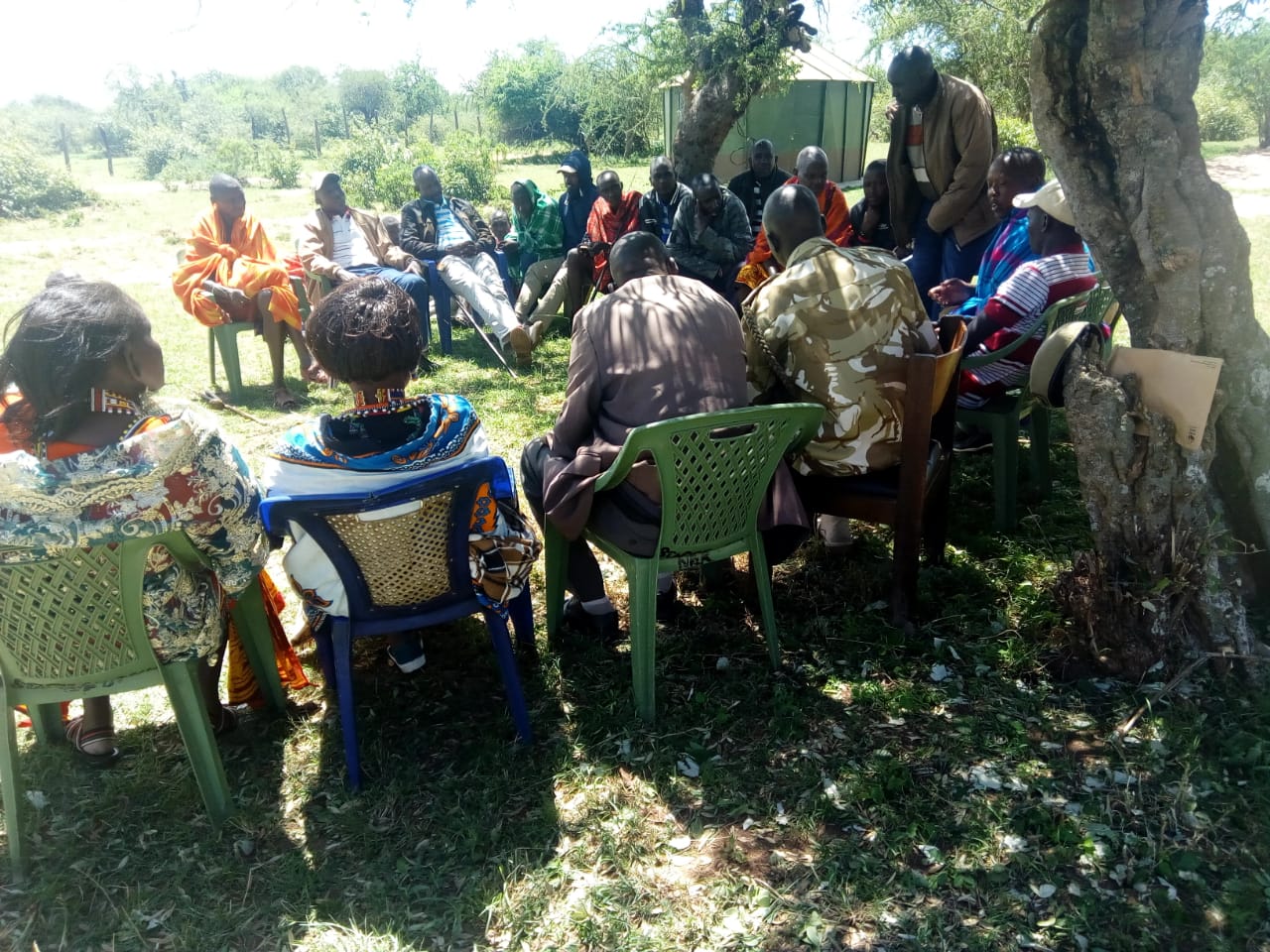
The HEC meeting that took place with key stakeholders.
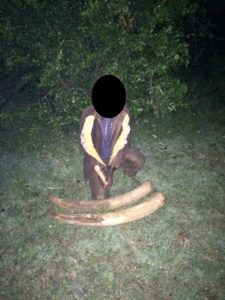
The MEP intelligence team were responsible for two notable ivory arrests in May and continues to truly be one of MEP’s brightest jewels. pictured right: the arrest of one suspect and seizure of 25 kg of ivory on May 19.
In addition to these arrests and ivory seizures, MEP rangers also removed 22 snares, destroyed two poacher’s camps, confiscated 40 cedar posts, 250 wood posts, eight sacks of charcoal and Kenya Wildlife Service arrested one suspect for illegal charcoal production. The Sheldrick Wildlife Trust Mau Team recovered more than 70 kg of illegal bushmeat in the Mases area and MEP rangers assisted the KWS Vet Dr. Limo with the Sheldrick Wildlife Trust Mara Mobile Vet Unit in two elephant treatments in May.

Suspect arrested on May 3 in possession of 17 kg of ivory.
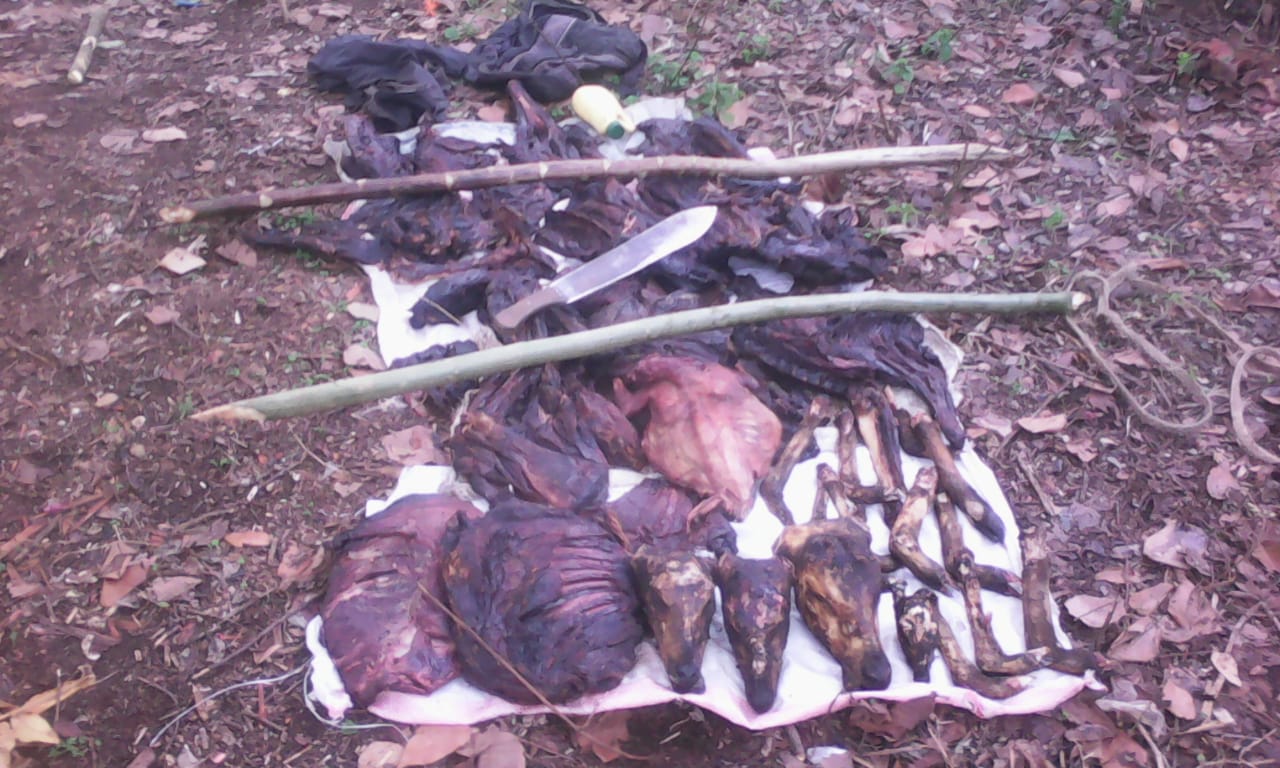
The 70 kg of bushmeat recovered by MEP rangers on May 12.

Our operational teams have received a huge boost from a long-time supporter Lori Price and the Elephant Crisis Fund (ECF), an initiative launched by Save the Elephants and the Wildlife Conservation Network, in partnership with the Leonardo DiCaprio Foundation. Their support has allowed MEP to increase patrol operations in the western portion of the ecosystem in the areas of Loita, Siyapei and Mosiro in the Rift Valley. This area continues to be a concern for elephant security and their presence will go a long way to improving security. In addition to this funding, MEP received notice this month from Paradise International Foundation that they would be supporting the protection of two collared elephants for three years and the operating costs of a rapid response vehicle.
The MEP Ranger School Fees Facebook Fundraiser raised $2,350 with 35 people who donated online and one of MEP’s long-time supporters chipped in another $5,000 to ensure we met our goal of close to $7,500, which was then matched by a grant awarded to MEP last month from the JE Fehsenfeld Foundation.
This means MEP has fully funded the 2019 Ranger School Fees program! Thank you to everyone for their support!
At the beginning of May, Dr. Jake Wall hosted Dr. Iain Douglas-Hamilton at MEP HQ to discuss ongoing collaborations with Save the Elephants (STE). STE has been at the forefront of elephant conservation and research for decades and helped to kickstart MEP’s own elephant tracking program. MEP also hosted a team from RESOLVE that are building an artificial intelligence (AI) based camera that uses a new processor developed by Intel for ‘edge analytics.’ The processor can run AI models in real-time to identify objects of interest within seconds. RESOLVE has harnessed this technology and combined it with a low-profile camera body and satellite modem that can be deployed in the field for months and remotely transmit only photos with either humans or wildlife in the photos. Known as TrailGuard, this will be a major breakthrough for camera trap technology as often a lot of false positives are triggered by a moving leaf or grass making it difficult to use camera traps in operational settings. We interfaced the TrailGuard cameras with MEP’s EarthRanger system and are ready to deploy them once they come off of the production line. In mid-May Dr. Lydia Tiller from the Elephants and Bees program in Tsavo visited MEP HQ. Lydia did her PhD work on human-elephant conflict in the Mara and will also be collaborating with MEP on our research. Finally, at the end of May Dr. Wall gave a guest lecture during an advanced GIS course taught at Karen Blixen Camp after being invited by Dr. Peder Bocher at Aarhaus University.
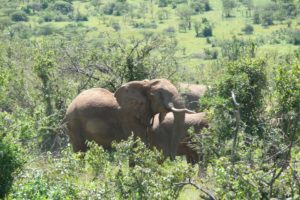 MEP collared elephant Caroline’s movements in May were of note. She is one of MEP’s longest continually tracked elephants in the Mara ecosystem and has been residing in an area with many human settlements. MEP got a geo-fence alert that was triggered by her movements into areas of settlement. What we noticed this month was that Caroline (pictured right) was climbing a hill in the early morning, staying on the hill throughout the day, then coming down the hill to drink at night, which is behavior indicative of elephants living in a stressful state in a human-dominated landscape. Although there is adequate vegetation on the hill where Caroline and her herd reside during the day, it costs an elephant 2,500 percent more energy to climb one vertical meter compared to traveling one meter horizontally and so frequent hill-climbing is not energetically profitable for an elephant. We do not know Caroline’s motivation for being in this area, but her movements have shifted out of her normal pattern of behavior and her use of the hill for daytime concealment and the night-time drinking indicate she was feeling under threat from the human factors in that area.
MEP collared elephant Caroline’s movements in May were of note. She is one of MEP’s longest continually tracked elephants in the Mara ecosystem and has been residing in an area with many human settlements. MEP got a geo-fence alert that was triggered by her movements into areas of settlement. What we noticed this month was that Caroline (pictured right) was climbing a hill in the early morning, staying on the hill throughout the day, then coming down the hill to drink at night, which is behavior indicative of elephants living in a stressful state in a human-dominated landscape. Although there is adequate vegetation on the hill where Caroline and her herd reside during the day, it costs an elephant 2,500 percent more energy to climb one vertical meter compared to traveling one meter horizontally and so frequent hill-climbing is not energetically profitable for an elephant. We do not know Caroline’s motivation for being in this area, but her movements have shifted out of her normal pattern of behavior and her use of the hill for daytime concealment and the night-time drinking indicate she was feeling under threat from the human factors in that area.
MEP held its AGM and board meeting on May 23 and in this meeting, Kevin Rodrigues was introduced and voted in as the newest MEP Trustee. Kevin is an investment professional with over 13 years of experience in investment banking, merchant finance and private equity gained in the United States, Europe and Africa. Kevin currently works as a Director at LGT Lightstone, managing investment activities in Eastern & Lusophone Africa. Kevin holds an MBA from London Business School, UK and a B.A. (Economics) from Northwestern University, USA. MEP is delighted to have him as a new trustee. During the meeting the board approved the amended budget, the 2018 audited accounts, new policies to address potential risks identified in the annual audit and re-appointed PKF as the auditors for 2019. Updates were also given to the board on operations, research and MEP’s fundraising position.
In terms of media coverage, MEP had an exciting month when the BBC Two series, Equator from the Air, aired in the UK on May 26 with the first episode featuring Mara Elephant Project. Additionally, the Daily Mail picked up on the story told during the episode about two elephant treatments MEP assisted with and featured MEP in an article the following Monday. All of this is great media exposure for Mara Elephant Project.


